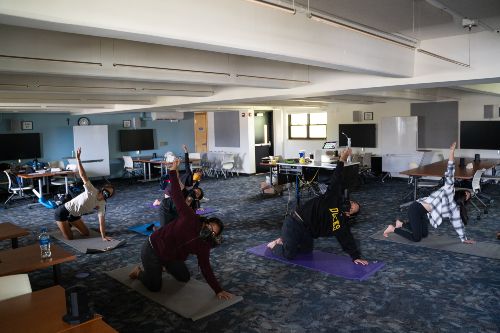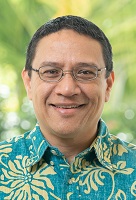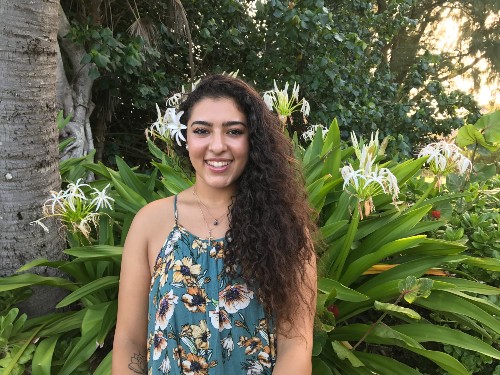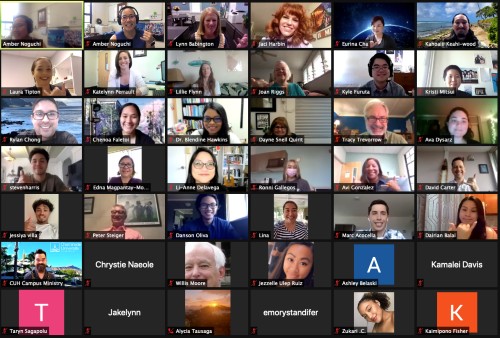Dozens of Hawai’i public high school students converged on Chaminade’s campus over the summer for a host of immersive learning opportunities—trying their hand at everything from spoken word poetry to marine conservation to designing a safehouse for a zombie apocalypse.
Chaminade’s Summer Institutes 2021 offerings, part of the University’s ongoing commitment to early college programming, gave rising juniors and seniors at two public high schools the chance to do a deep dive into disciplines of high interest.
The intensive, 10-day courses were free to McKinley and Kaimukī high school students and also included standalone college preparatory sessions on how to pay for higher education, apply for financial aid, select an academic pathway and build leadership skills.
Dr. Janet Davidson, Chaminade Vice Provost for Academic Affairs, said 37 students participated across five Summer Institutes courses. The offerings were made possible in part thanks to a US Department of Education GEAR UP grant.
Davidson said GEAR UP is focused on boosting college attendance among low-income students. To promote that goal, she said, the Summer Institutes program at Chaminade offered participants a high-quality, engaging college-level experience.
“The students had rewarding experiences on our campus—with each other and with their faculty and peer mentors,” Davidson said, adding that enrollees also benefitted from co-curricular sessions with the University’s advising, financial aid and admissions offices.
“Through our Summer Institutes, we aimed to support the academic growth of students, but also provided a series of college readiness sessions. We look forward to growing on our successes this year and provide even more institutes next summer.”
Doing It Yourself: A New World

Among the available academic sessions was a course—taught by Accounting Professor Aaron Williamson—on entrepreneurship, business modeling and communication skills. “Doing It Yourself: A New World” also included an emphasis on leadership and team building.
Williamson said he wanted the immersion program to give students a “taste of what business really is. At its root, business is the thoughts, dreams and initiatives of a multitude of folks from history to present who simply had an idea and acted on it.”
He added that he was most excited to watch students tap into their passions and personal interests—and then figure out how to direct that energy into a business plan.
“I fully expect to be walking into a few of their establishments one day,” he added.
Word Wizards: The Magic of Poetry and Hip Hop

English Professor Dr. Allison Paynter drew from English 256 (Poetry and Drama) to design her summer institute course entitled, “Word Wizards: The Magic of Poetry and Hip Hop.” In addition to analyzing hip hop lyrics, traditional poetry and verse-driven dramas, students wrote poetry and then put on spoken word performances.
Paynter, herself a performance poet, said she most enjoyed seeing her student participants collaborate with one another on writing.
“I also loved watching my students perform their original poetry during our Spoken Word event,” she said. “I would like to believe each student felt empowered through the process of writing creative pieces.”
Marine Science Immersion

Dr. Gail Grabowsky, dean of the School of Natural Sciences and Mathematics at Chaminade, co-taught a “Marine Science Immersion” summer course with Dr. Lupita Ruiz-Jones, an assistant professor of Environmental Sciences. Students in the session spent the first week exploring the ocean environment from the perspective of a marine scientist and the second considering the impacts of humans on marine ecosystems.
Participants spent time in the classroom, lab and, of course, the ocean.
Ruiz-Jones said students took field trips to Waimea Bay, Sharks Cove, Makapuu, Makaha and Ala Moana Beach. They even took a walk from campus to nearby Pālolo Stream, inspiring three students to return the following weekend for a stream cleanup project.
Grabowsky said a central takeaway of the course for students was just how incredible marine systems are—and how important they are to preserve.
“I wanted them to walk away with a knowledge of the ocean, of course, but also a feeling that college is wonderful and an understanding of how it works,” she said. “I hope they all came away loving Chaminade!”
Psychology Studies

Psychology Associate Professor Dr. Darren Iwamoto led a course in Psychology Studies, challenging students to take a journey of self-discovery and self-awareness to understand the importance of mental health in everyday life.
Iwamoto, who is clinical director of the School Counseling and Undergraduate Psychology programs at Chaminade, said he kicked off the course with two questions: Why do we do what we do? And why do we think what we think?”
It was through those lines of inquiry that Iwamoto encouraged students to consider how they tackle stress, handle change and plan for the future—and how they might apply new and healthier coping strategies in their own lives to promote personal wellbeing.
“It was so memorable to watch so much personal and academic growth in just two weeks,” he said, adding that he also learned so much about his own teaching from the experience.
“I had to learn different strategies of student engagement because I didn’t have grades being the underlying motivator,” he said. “I really like how this Summer Institute flowed and how students experienced psychology versus being told about it.”
Visualizing the Future

The fifth offering over the summer was called “Visualizing the Future.”
Dr. Junghwa Suh, an associate professor of Arts and Design at Chaminade, led the course—modeled after Art 103 or Visual Design. Students were introduced to the power of visualizations and used problem-solving skills and design tools to create models.
After learning the basics of hands-on modeling tools, Suh set the students to work in groups to create a zombie safehouse—yes, you read that right. Suh said the engaging project required students to think about space planning while trying to figure out how to protect the safehouse’s occupants from a decidedly horrific fate.
“I wanted my students to get a clear and dynamic overview of arts and design, see the connection of arts and design to various disciplines … and use their creativity and logical processing to execute design solutions to given problems,” she said.
Suh added that the students’ final safehouse designs were impressive.
“I hope these creative minds gained some new perspectives in arts and design and understand various possibilities they can pursue with this study,” she said.
And she’s already looking forward to next summer’s courses. “It is so beneficial for students to see how different disciplines come together to solve world problems,” she said. “These types of institutes help high school students in making decisions on what they want to study.”









